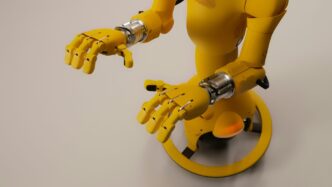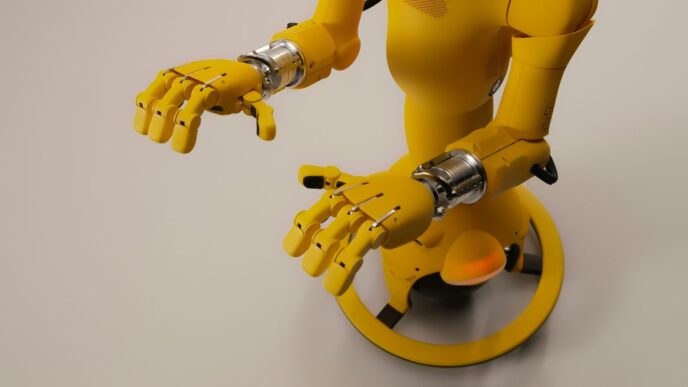Okay, so AI is everywhere now, right? It feels like just yesterday it was this super technical thing only computer whizzes knew about, and now, thanks to stuff like ChatGPT, everyone’s talking about it. The numbers are pretty wild, too – the AI market is expected to get massive in the next few years. It’s not just for big companies anymore; if you’ve got a good idea, starting an AI business could be a really smart move. Lots of people are jumping in, so you’ve got to have something unique to stand out, but the opportunities are definitely there. Let’s look at some cool AI startup ideas for 2025 that could be big winners.
Key Takeaways
- The AI market is expanding rapidly, creating significant opportunities for new businesses.
- AI can be integrated into existing businesses or used to launch entirely new ventures.
- Differentiating your AI startup with unique value is key in a competitive market.
- Accessibility to AI development platforms is lowering the barrier to entry for new entrepreneurs.
- Focusing on specific problems and offering custom solutions can lead to success.
1. AI-Powered Chatbots for Customer Service
Customer service is changing, and AI chatbots are a big part of that. These smart bots can talk to customers, answer questions, and even help with simple tasks. Think of them as digital helpers that are always available, day or night. This means customers don’t have to wait on hold as much, which is usually a good thing.
AI chatbots can handle a lot of common questions, freeing up human staff for trickier problems. They can also learn from past conversations to give more personal answers. This can make customers feel more understood.
Here’s a quick look at what they can do:
- 24/7 Support: Always on, always ready to help.
- Faster Answers: Get quick responses to common questions.
- Cost Savings: Reduce the need for a large human support team.
- Data Collection: Gather info on what customers are asking about.
Of course, they aren’t perfect. Sometimes, a chatbot might not get a complex question or can’t show the same kind of understanding a person can. It’s important to have a way for customers to reach a human if the bot can’t help. But for many routine interactions, AI chatbots are becoming a really useful tool for businesses.
2. AI-Driven Personalized Marketing
Marketing has changed a lot, hasn’t it? It used to be about shouting into the void and hoping someone listened. Now, with AI, it’s more like having a quiet, one-on-one chat with each potential customer. Think about it: instead of sending out a generic email blast to everyone on your list, AI can look at what each person has liked, clicked on, or even searched for. Then, it can tailor the message specifically for them.
This isn’t just about putting someone’s name in an email, either. AI can figure out the best time to send that message, what kind of offer might grab their attention, and even what tone of voice to use. It’s like having a marketing assistant who knows every single customer personally.
Here’s a quick look at how AI is shaking things up:
- Predictive Analytics: AI can look at past customer behavior and predict what they might want or do next. This helps businesses get ahead of the curve.
- Hyper-Personalization: Campaigns can be adjusted on the fly for individual users, making them feel like the message was made just for them. This boosts engagement.
- Automated Campaign Management: AI can handle a lot of the repetitive tasks, like segmenting audiences or adjusting ad bids, freeing up marketers to focus on bigger ideas.
- Real-time Optimization: AI constantly monitors how campaigns are doing and makes changes instantly to improve results. No more waiting weeks to see if something worked.
The goal is to make marketing feel less like an interruption and more like a helpful suggestion. It’s about building relationships by showing customers you understand what they need, even before they fully realize it themselves. This approach not only makes customers happier but also tends to bring in better results for the business.
3. AI in Healthcare Diagnostics
This is a big one, folks. AI is really starting to make waves in how doctors figure out what’s wrong with people. Think about medical images – X-rays, MRIs, CT scans. AI can look at these and spot things that might be really tiny, or easy for a human eye to miss, especially when a doctor is looking at hundreds of scans a day. It’s not about replacing doctors, but giving them a super-powered assistant.
AI can analyze vast amounts of medical data, like patient histories and test results, to help pinpoint diseases earlier. This means quicker diagnosis and, hopefully, better treatment plans. We’re already seeing AI tools used to find early signs of things like tuberculosis in certain regions, and it’s also helping with diagnosing skin conditions, particularly in people with darker skin tones who have historically been underrepresented in medical studies. Building these kinds of AI tools opens up opportunities to work with hospitals and clinics that want more efficient and accurate ways to diagnose patients. It’s a pretty exciting area for innovative healthcare business ideas.
Here’s a quick look at what AI is doing:
- Image Analysis: Spotting anomalies in scans that might indicate early-stage diseases.
- Pattern Recognition: Identifying trends in patient data that could predict future health issues.
- Personalized Medicine: Using genetic data to suggest the most effective treatments for an individual.
It’s all about making healthcare more precise and accessible. The goal is to catch problems sooner and tailor treatments to each person, which could really change patient outcomes for the better.
4. AI-Based Content Creation Tools

It feels like everywhere you look these days, there’s a new tool promising to write your blog posts, whip up social media updates, or even generate entire articles. And honestly? Some of them are pretty good. These AI-powered content creation tools are changing the game for marketers, writers, and businesses of all sizes. They can take a simple prompt and turn it into something usable, which is a huge time saver.
Think about it: instead of staring at a blank page, you can get a first draft in seconds. This really helps when you’ve got a lot of content to produce, like for a website or a marketing campaign. The real magic happens when these tools go beyond just writing text and start helping with visuals too. Some can generate images based on descriptions, which is fantastic for blog posts or ads. Others are getting better at creating short videos, which is a whole other level of efficiency.
Here’s a quick look at what these tools can do:
- Text Generation: From blog posts and website copy to email newsletters and ad text.
- Image Creation: Generating unique visuals for marketing materials, social media, or website backgrounds.
- Video Scripting & Storyboarding: Helping to outline video content and even generate basic scripts.
- Content Repurposing: Taking existing content and adapting it for different platforms.
Of course, they aren’t perfect. You still need a human touch to edit, fact-check, and add that unique brand voice. But as a starting point or for churning out routine content, they’re incredibly useful. Businesses looking to scale their content output without a massive increase in staff are definitely finding value here. It’s a smart way to explore top AI business ideas if you’re looking to get into the tech space.
5. AI-Based Web Design and App Development
Building a website or a mobile app used to take a lot of technical skill and time. Now, with AI, that’s changing fast. Think about it: you can get a pretty decent website up and running without knowing a single line of code. Tools are popping up that use AI to help you design, build, and even write content for your site. This really opens things up for small businesses or individuals who don’t have big budgets for developers.
It’s not just about websites, either. Creating apps is getting simpler too. Platforms are emerging that let you build functional apps using AI, focusing on the core features that make your idea work. This means you can get your concept out there and test it with real users much quicker than before. The goal is to make digital creation accessible to more people.
Here’s a quick look at how AI is changing the game:
- Automated Design: AI can suggest layouts, color schemes, and even generate images based on your input.
- Code Generation: Some tools can write basic code snippets or even entire website structures from simple descriptions.
- Content Integration: AI can help populate your site with text and images, making the setup process faster.
- Personalization: AI can help tailor the user experience on your site or app based on visitor behavior.
This shift means more people can bring their digital ideas to life. You can even find services that help you build your own software without needing a team of programmers. It’s a pretty exciting time if you’ve got an idea for an app or a website you want to get online. You can explore platforms that help you build your own AI business app without extensive coding knowledge.
6. AI for Language Translation
Breaking down language barriers is a big deal, and AI is making it easier than ever. Think about it: businesses, schools, even just regular folks trying to talk to someone across the globe. AI translation tools are getting really good, often much better and cheaper than what a person could do.
The accuracy of these AI translators is what really sets them apart. Services that use advanced machine learning, like DeepL, have shown they can be more precise than older systems, which is why they’ve become so popular. This technology is improving fast, and there’s a real need for solutions that can translate text and speech almost instantly.
Here’s a look at what makes AI translation so promising:
- Real-time Translation: Imagine having a conversation with someone who speaks a different language, and the translation happens as you speak. This is becoming a reality.
- Document Translation: Need to understand a report or a contract in another language? AI can handle entire documents quickly.
- Contextual Understanding: Modern AI doesn’t just swap words; it tries to grasp the meaning and nuance of sentences, leading to more natural-sounding translations.
As the global artificial intelligence market continues to grow, AI for language translation is a solid area to consider for a startup. It addresses a clear need and has applications across many different fields. You can find more about AI assistants and their role in daily life on pages about AI assistants.
7. AI-Powered Personal Assistants
You know, those digital helpers we talk to? They’re getting seriously smart. We’re talking about AI assistants that do more than just set timers or play music. Think of them as your personal concierge, but living inside your phone or smart speaker. They can manage your schedule, sort through your emails, and even give you advice based on what they know about you. It’s pretty wild how they can learn your habits and preferences over time.
These assistants are really starting to show up in places you might not expect, too. Hotels are using them to help guests with room service orders or to get information about the area. Restaurants are looking into them for taking reservations or even answering questions about the menu. It feels like they’re becoming a standard part of customer service.
What’s next? Well, imagine an assistant that doesn’t just manage your tasks but also acts as a companion. They could offer personalized recommendations for entertainment, help you plan your meals, or even just chat with you. Some are even being designed to help with specific needs, like reminding seniors to take their medication or helping busy parents manage household chores. It’s all about making life a little bit easier and more organized.
Here’s a quick look at what makes them tick:
- Natural Language Processing: This is how they understand what you’re saying, even if you don’t speak perfectly. They’re getting much better at figuring out context and intent.
- Machine Learning: This is the secret sauce that lets them learn from your interactions. The more you use them, the better they get at predicting what you need.
- Integration: They connect with all sorts of other apps and devices, from your calendar to your smart home gadgets, to get things done.
It’s a busy space, for sure, with big names already out there. But there’s still room for new ideas, especially if they focus on a specific group of people or a particular type of task. The goal is to create something that feels genuinely helpful, not just another piece of tech.
8. AI for Predictive Maintenance
You know, keeping machines and equipment running smoothly without unexpected hiccups is a big deal for pretty much any business. That’s where AI for predictive maintenance comes in. Instead of just waiting for something to break and then fixing it, this approach uses AI to look at data from your equipment and figure out when maintenance is actually needed. It’s like having a mechanic who can see the future.
Think about it: AI systems can constantly collect information – things like vibration levels, temperature changes, or how much a machine is being used. By analyzing this data, the AI can spot tiny patterns that usually show up right before a part fails. It’s not just guessing; it’s using real-time info to make smart calls.
So, what does this mean for a business? Well, a lot, actually. You can schedule maintenance during times that don’t disrupt production, which saves a ton of money compared to emergency repairs. Plus, it helps avoid those really costly breakdowns that can shut down an entire operation. It’s a pretty smart way to keep things running and save cash.
Here’s a quick look at how it works:
- Data Collection: Sensors on equipment gather information like temperature, pressure, vibration, and usage hours.
- AI Analysis: Machine learning algorithms process this data, looking for anomalies or patterns that indicate potential issues.
- Alerts & Recommendations: The system flags potential problems and suggests when maintenance should be performed.
- Action & Prevention: Maintenance is scheduled proactively, preventing unexpected failures.
This kind of AI can be used in all sorts of places, from big factories with lots of machinery to even things like HVAC systems in large buildings. It’s all about being one step ahead and keeping things running without any surprises.
9. AI Technology in Autonomous Vehicles
Autonomous vehicles are really changing how we get around, and AI is the engine making it all happen. Think about it: cars, trucks, even delivery bots, all figuring out how to navigate roads without a person behind the wheel. This isn’t just about self-driving cars, though that’s a big part of it. It’s also about how AI helps these vehicles understand their surroundings.
AI systems in these vehicles use sensors and cameras to "see" the road. They identify other cars, pedestrians, traffic lights, and road signs. Then, complex algorithms process all this information in real-time to make decisions about steering, braking, and accelerating. The goal is to make transportation safer and more efficient.
Here’s a quick look at what AI is doing in this space:
- Perception: AI algorithms analyze data from cameras, lidar, and radar to build a 3D map of the vehicle’s environment.
- Prediction: Based on the perceived environment, AI predicts the future movements of other road users.
- Planning: The AI then plans the vehicle’s path and actions, like changing lanes or stopping at an intersection.
- Control: Finally, AI systems translate these plans into commands for the vehicle’s steering, throttle, and brakes.
We’re seeing AI applied to everything from passenger cars to long-haul trucks and last-mile delivery robots. The potential for reducing accidents caused by human error and optimizing traffic flow is huge. It’s a complex field, but the progress being made is pretty remarkable.
10. AI-Powered Financial Planning Solutions
It feels like everyone is trying to get a handle on their money these days, and AI is stepping in to help. Think about it: instead of just looking at spreadsheets, AI can actually spot trends in your spending that you might miss. It takes all that complicated financial data and makes it easier to understand what’s actually going on.
One big area is automating the boring stuff. AI can handle things like making budgets, predicting future income and expenses, or even putting together reports. This frees up financial planners to do the parts that really need a human touch, like talking through big life decisions with clients. It’s about making their jobs more efficient so they can focus on what matters most.
Another angle is creating AI tools that give people direct financial advice. Imagine a chatbot that’s available anytime, day or night, to answer your money questions. This could make getting good financial advice much more affordable for regular folks. It’s a way to democratize access to expert-level investment strategies. We’re seeing AI tools that can analyze global economic trends and your personal risk tolerance to suggest investment plans that fit your specific goals. It’s like having a financial advisor in your pocket, ready to help you manage your finances.
Here’s a quick look at what these AI solutions can do:
- Personalized Budgeting: AI analyzes your spending habits to create custom budgets.
- Investment Recommendations: Based on your goals and risk, AI suggests investment options.
- Financial Forecasting: Predicts future income and expenses to help with planning.
- Automated Reporting: Generates easy-to-understand financial reports.
The goal is to make financial planning more accessible and effective for everyone.
11. AI for Social Media Management
Managing social media these days feels like a full-time job, right? Between creating posts, figuring out the best times to share them, and actually talking to people, it’s a lot. That’s where AI startups are stepping in to make things way easier for everyone, from solo creators to big companies. These tools can automate a lot of the grunt work, freeing up time for more creative stuff.
Think about it: AI can help write captions, suggest hashtags, and even create simple graphics. It can also track what people are saying about your brand online, so you know if there’s a problem brewing or if people are loving what you’re doing. Some platforms can even figure out the optimal times to post your content for the most engagement. It’s like having a super-smart assistant who knows all the social media tricks.
Here’s a quick look at what AI can do for social media:
- Content Creation: Generating post ideas, writing copy, and even suggesting visuals.
- Scheduling & Optimization: Finding the best times to post for maximum reach and engagement.
- Performance Tracking: Analyzing what’s working and what’s not, so you can adjust your strategy.
- Audience Engagement: Monitoring comments and messages, and even helping to draft responses.
- Trend Analysis: Spotting emerging topics and conversations relevant to your brand.
Tools like Hootsuite are already doing a lot of this, but there’s still plenty of room for new ideas. Maybe an AI that specializes in video content for TikTok, or one that can predict viral trends before they even happen? The possibilities are pretty wide open for anyone looking to simplify social media management.
12. AI in Video Game Development
The video game industry is huge, and making games, especially the big ones, costs a ton of money. We’re talking hundreds of millions for some titles. This is where AI is starting to make a real difference.
Think about it: AI can help make game development faster and maybe even cheaper. It can assist with creating game assets, like textures or character models, which usually takes a lot of time and skilled artists. AI can also help design game levels, making them more interesting and varied. One of the most exciting parts is how AI can make game characters, the non-player characters or NPCs, act more realistically. Instead of following simple scripts, these characters could react to players in more complex ways, making the game world feel more alive.
Here are a few ways AI is changing game development:
- Smarter NPCs: AI can give characters in games more complex behaviors and reactions, making interactions feel more natural and less predictable.
- Procedural Content Generation: AI can create vast game worlds, unique quests, or even entire storylines that adapt to the player’s actions, offering a fresh experience each time.
- Player Behavior Analysis: AI can study how players play games to help developers understand what’s fun, what’s frustrating, and how to improve the game experience for everyone.
- Automated Testing: AI can be used to playtest games, finding bugs and glitches much faster than human testers could alone.
13. AI for Cybersecurity
Cybersecurity is a massive field, and honestly, it feels like it’s always playing catch-up. That’s where AI comes in, and it’s not just a buzzword here; it’s becoming a real necessity. Think about it: the bad guys are getting smarter, using more sophisticated methods to break into systems. AI offers a way to get ahead of them, or at least keep pace.
One of the biggest areas is threat detection. Instead of just reacting to known viruses, AI systems can actually learn what normal network activity looks like. When something deviates from that norm, even if it’s a brand-new type of attack, the AI can flag it. This proactive approach is a game-changer. It’s like having a security guard who doesn’t just know the usual troublemakers but can spot someone acting suspiciously even if they’ve never seen them before.
Here are a few ways AI is shaking things up:
- Predictive Threat Analysis: AI models can sift through mountains of data – network logs, global threat intelligence, even social media chatter – to predict where the next attack might come from. This lets companies shore up defenses before anything happens.
- Automated Response: When a threat is detected, AI can initiate immediate actions, like isolating an infected system or blocking suspicious IP addresses. This speed is something humans just can’t match, and it can stop an attack in its tracks.
- Behavioral Biometrics: Forget passwords that can be stolen. AI can analyze how you type, how you move your mouse, or even your voice patterns to verify it’s really you. It’s a more secure and often more convenient way to get access.
It’s not just about stopping hackers, either. AI can also help with things like identifying phishing attempts in emails or detecting malware that’s trying to sneak onto a system. The global cost of cybercrime is staggering, so any tool that can effectively reduce that risk is going to be in high demand. Building a standout AI cybersecurity solution means focusing on unique features that genuinely help businesses and individuals stay safe online. For example, an AI that can simulate cyber attacks to test a company’s defenses could be a really strong offering. It’s a tough market, but the need for better security is only growing, making this a prime area for innovation. You can explore some of the top AI business ideas to see how AI is being applied across different sectors.
14. AI-Based Fitness and Wellness Solutions
The fitness and wellness industry is huge, and AI is really shaking things up. Think about getting workout plans made just for you, based on your height, weight, how fit you are, what you eat, and what you want to achieve. It’s pretty neat.
AI tools can also look at your meals and give you feedback, or spot trends in your daily life, like if you’re moving more or less, or if your sleep patterns are changing. By using data from your phone, smartwatches, heart rate monitors, and even your food logs, these systems can offer personalized support. They help you stick to your goals and build healthier habits over time. This is a massive opportunity, whether you’re aiming for fitness buffs, wellness startups, or even healthcare providers. Building an app that can do this is a solid idea for a new business. You can check out how to build an AI-powered fitness app here.
Here’s what an AI fitness solution might offer:
- Personalized workout routines
- Nutritional advice and meal tracking
- Sleep pattern analysis
- Progress monitoring and feedback
- Motivation and habit-building support
15. AI in Environmental Monitoring
Keeping an eye on our planet’s health is getting a big boost from artificial intelligence. Think about it: AI can sift through massive amounts of data from sensors, satellites, and even ground-level monitors way faster than any human team could. This means we’re getting real-time updates on things like air quality, helping cities figure out where pollution is worst and how to tackle it.
AI is also becoming a key player in tracking carbon emissions, giving us better data to work with for carbon capture projects and offsetting efforts. As more companies and governments aim for carbon neutrality, businesses that can accurately measure and report CO2 output using AI will be in high demand. It’s not just about spotting problems, though. AI can also help optimize resource use, predict environmental changes, and even assist in managing natural resources more sustainably. This area has serious potential for growth as environmental awareness continues to rise.
16. AI for Supply Chain Optimization
Supply chains are complicated beasts, right? Keeping track of everything, from raw materials to getting the final product to someone’s doorstep, can be a real headache. Inefficiencies here cost businesses a ton of money and time. That’s where AI comes in, ready to sort out the mess.
Think about building software that helps companies figure out the best time to order more supplies. It could look at past sales, predict when something will run out, and even automatically place the order. This kind of predictive ordering can stop stockouts and overstocking dead in their tracks.
But we can go further. Imagine an AI that looks at your suppliers and automatically picks the ones that use less plastic packaging or are closer by to cut down on shipping emissions. It’s not just about saving money; it’s about making the whole process greener.
Here are a few ways AI can really make a difference:
- Demand Forecasting: AI can analyze sales history, market trends, and even weather patterns to predict customer demand more accurately than ever before. This means less wasted product and happier customers who can actually buy what they want.
- Inventory Management: AI systems can keep a close eye on stock levels across different locations, suggesting transfers or reorders to keep everything balanced and avoid costly shortages or excess inventory.
- Route Optimization: For companies with delivery fleets, AI can plan the most efficient routes, considering traffic, delivery windows, and fuel costs. This saves time, money, and reduces the carbon footprint.
- Supplier Risk Assessment: AI can scan news, financial reports, and other data to flag potential problems with suppliers, like financial instability or ethical concerns, before they impact your business.
17. AI in Retail Settings
The retail world is changing fast, and AI is a big reason why. Think about walking into a store and having everything feel like it was picked out just for you. AI can look at what you’ve bought before, what you’ve browsed online, and even what you like on social media to suggest items you might actually want. This makes shopping better for customers and keeps them coming back.
It’s not just about recommendations, though. AI is also cleaning up how stores manage their stock. No more finding empty shelves or having too much of something nobody wants. AI systems can predict what people will buy, look at sales patterns, and keep inventory levels just right, all in real-time. This means less wasted product and more chances to sell.
And let’s talk about checkout. Those long lines? AI is helping to get rid of them. With self-checkout options, paying with your phone, or even stores where you just grab what you need and walk out, AI makes buying things quicker and easier. It even helps stores save money on operations.
Security is getting smarter too. AI can watch store activity, spot unusual behavior, and help stop theft. Some systems can even recognize regular customers and give them a special greeting or a deal. It all adds up to a safer shopping trip.
Here’s a quick look at how AI is making a difference:
- Personalized recommendations: AI suggests products based on your history and preferences.
- Smart inventory: AI predicts demand to keep the right products in stock.
- Faster checkout: AI powers self-service and cashierless payment options.
- Better security: AI video analysis helps prevent theft and monitor activity.
- Targeted marketing: AI helps retailers send the right offers to the right people.
18. AI for HR and Recruitment
Human resources and recruitment are areas where AI is really starting to make a difference. Think about how much time recruiters spend sifting through resumes. AI can automate a lot of that initial screening, looking for keywords, skills, and experience that match the job description. This means human recruiters can spend less time on repetitive tasks and more time actually talking to promising candidates. It’s about making the hiring process faster and, hopefully, fairer.
AI tools can also help with candidate matching, going beyond simple keyword searches to find people whose skills and career paths align well with a role. This can lead to better hires who stick around longer. Plus, AI can analyze data to predict which employees might be thinking of leaving, giving HR a heads-up to try and keep them. This proactive approach can save companies a lot of money on recruitment costs.
Here are a few ways AI is changing HR:
- Automated Resume Screening: AI algorithms quickly go through applications to find the best fits, saving hours of manual work.
- Predictive Turnover Analytics: By looking at employee data, AI can flag individuals at risk of leaving, allowing for early intervention.
- Enhanced Candidate Matching: AI helps connect the right people to the right jobs based on a deeper analysis of skills and experience.
- Onboarding Streamlining: AI can automate parts of the onboarding process, making it smoother for new hires.
It’s important to remember that while AI is powerful, it’s not perfect. There’s always a risk of bias creeping into the algorithms if they aren’t carefully managed. Companies need to be mindful of this and actively work to ensure their AI tools are fair and don’t accidentally screen out good candidates. Building a solid AI agent for recruitment requires careful planning and ongoing checks to make sure it’s working as intended.
19. AI for Art and Music Generation
It’s pretty wild how AI is stepping into the creative arts these days. We’re seeing tools that can whip up original artwork from just a text description, or even compose entire music tracks. Think about it – no more staring at a blank canvas or struggling with writer’s block for a melody. These AI systems are trained on vast datasets, learning patterns and styles to generate something entirely new.
This opens up a lot of possibilities for artists and musicians. You could use AI to brainstorm ideas, create background music for your videos, or even generate unique visual assets for a project. For instance, platforms like SOUNDRAW are making it easier for creators to get custom music without worrying about copyright.
However, it’s not all smooth sailing. There’s a lot of talk about the ethics and legality of AI-generated art and music. Since these AIs learn from existing works, some people feel it’s like digital theft. Finding ways to train these models on copyright-free material is a big challenge, but it could also be a unique selling point for a new startup.
Here are a few ways AI is shaking things up in art and music:
- Visual Art: Generating unique images, illustrations, and even animations based on prompts.
- Music Composition: Creating original melodies, harmonies, and full tracks in various genres.
- Interactive Experiences: Developing dynamic soundtracks for games or personalized music playlists.
- Design Assistance: Suggesting color palettes, layouts, or stylistic elements for artists.
20. AI in Legal Services
The legal field is a prime candidate for AI disruption, and frankly, it’s about time. Think about all the paperwork lawyers have to sift through – it’s a mountain. AI can really help here by automating a lot of those repetitive document review tasks. This frees up legal professionals to focus on the actual strategy and client interaction, which is where they really add value.
Beyond just document management, AI can also be used for more complex tasks. Imagine an AI that can quickly pull out key information from massive legal texts, or one that helps assess the likelihood of winning a case based on past outcomes. It’s not about replacing lawyers, but giving them better tools.
Here are a few ways AI is changing the game:
- Automated Document Review: AI can scan and analyze thousands of documents in minutes, identifying relevant clauses, inconsistencies, or potential risks that a human might miss or take days to find.
- Legal Research Assistance: Instead of manually searching through case law and statutes, AI tools can quickly find relevant precedents and legal arguments, speeding up the research process significantly.
- Predictive Analytics: AI can analyze historical case data to predict potential outcomes, helping lawyers and clients make more informed decisions about litigation strategy.
- Contract Analysis: AI can review contracts for compliance, identify unfavorable terms, and even help draft standard agreements, reducing errors and saving time.
Developing AI solutions for legal research, like a tool that quickly analyzes and cross-references legal data to offer accurate insights, presents a solid business opportunity. The demand for efficiency and accuracy in legal work is only growing, making these AI applications quite promising. Many law firms are already looking into AI legal tech companies to streamline their operations.
21. AI for Agriculture
Farming is getting a serious tech upgrade, and AI is leading the charge. Think about it: instead of just guessing, farmers can now use AI to figure out exactly how much seed or fertilizer a specific field needs. These systems actually learn and get better at it over time, which is pretty neat. It’s not just about planting, either. AI can help predict harvest yields by looking at weather patterns, and even guide self-driving tractors around the fields. This kind of precision agriculture means less waste and better use of resources. The goal is to make farming more efficient and sustainable. We’re seeing AI tools that can analyze data from sensors and satellites to spot potential crop diseases early or figure out the best times to water. This helps farmers make smarter decisions, leading to healthier crops and bigger harvests. It’s a big shift from traditional methods, and it’s helping to feed more people with fewer resources. For those looking to get into this space, developing tools that offer these kinds of insights could be a real game-changer for the industry. It’s a field where innovation can have a direct impact on food production and environmental care, and there are plenty of opportunities for new businesses to help farmers adapt to these changes. You can even find services that help teams find new job opportunities, which is a different kind of optimization, but still about making things work better. career opportunities
22. AI in the Real Estate Sector
The real estate world is getting a serious AI upgrade, and it’s not just about fancy algorithms predicting house prices anymore. Think about estate agents, landlords, and property managers – they’re all finding ways AI can make their jobs easier and more effective. AI software can now automatically adjust property valuations by looking at broad market trends and even predict shifts before they happen. This means agents can price properties more accurately and investors can spot opportunities faster. It’s a big change from just looking at comparable sales from a few months ago.
We’re also seeing AI pop up in property management. Imagine systems that keep an eye on things in rental properties in real-time, like checking if the heating is working or if there’s a leak. This kind of monitoring can help prevent bigger problems down the line. Plus, AI is getting good at handling parts of real estate marketing. It can help identify who might be interested in buying a property and figure out the best places to advertise to them, cutting down on wasted ad spend. It’s about making the whole process, from finding a buyer to managing a property, much smoother. For anyone looking to get into this space, there are a lot of AI agent startup ideas that could be adapted for real estate needs, like agents that help manage listings or find potential tenants.
23. AI for Waste Management
Waste management is a big deal, right? It’s getting more complicated, and we need smarter ways to handle all the stuff we throw away. That’s where AI comes in. Think about using AI-powered cameras at sorting facilities. These systems can spot hazards that might be missed by people, making the whole operation safer. Plus, AI can really help us figure out what’s happening with our trash.
It can analyze data to tell us, for example, what percentage of waste is actually getting recycled, how much is ending up in landfills, and what’s being reused. This kind of information is super useful for cities and companies trying to be more sustainable.
And then there’s the robotics side of things. AI is helping robots get much better at sorting materials. They can quickly separate recyclables from non-recyclables, which not only speeds things up but also means fewer people have to do the more unpleasant jobs. It’s a pretty neat way to make waste management more efficient and a bit safer for everyone involved.
24. AI in Traffic Management

Cities are getting more crowded, and getting around can be a real headache. That’s where AI comes in for traffic management. Think about systems that can actually watch the flow of cars and then change the traffic light timings on the fly. It’s not just about making lights green when there are no cars; it’s about really understanding traffic patterns.
AI can also spot problems before they become major issues. It can detect when there’s been an accident or even notice if a road surface is starting to break down. This means the right people get alerted faster, which can make a big difference in getting things cleared up or fixed.
Here’s a quick look at what AI can do for traffic:
- Reduce travel times: By optimizing traffic light sequences and suggesting alternate routes, AI helps cars move more smoothly.
- Cut down on pollution: Less idling and smoother traffic flow means fewer emissions.
- Improve safety: Spotting accidents quickly and identifying dangerous road conditions helps prevent further issues.
- Manage parking: Some systems can even guide drivers to available parking spots, cutting down on cars circling the block.
Basically, AI can make our daily commutes less stressful and our cities run a bit better. It’s a smart way to handle a complex problem that affects everyone.
25. Niche Content AI Writer and more
Okay, so we’ve talked a lot about AI for big, broad things, but what about the super specific stuff? That’s where niche content AI writers come in. Think about it: instead of a general AI that can write about anything, you’ve got one that’s a total pro at, say, writing product descriptions for Etsy sellers, or maybe crafting legal disclaimers for small businesses. It’s about getting really good at one thing.
This isn’t just about churning out more words; it’s about making those words actually work for a particular audience or purpose. For example, an AI trained specifically on medical journals could help researchers draft papers faster, or an AI focused on real estate listings could help agents write more compelling property descriptions. The key is specialization. By focusing on a very specific niche, these AI tools can offer a level of quality and relevance that broader tools just can’t match.
Here’s a quick look at how this plays out:
- Hyper-focused Training: The AI is fed data only from its specific niche, like fashion blogs or technical manuals.
- Tailored Output: The generated content sounds like it was written by an expert in that field.
- Efficiency Boost: Professionals in that niche save time on writing tasks they might not enjoy or have time for.
This approach is a smart way to stand out in a crowded market. Instead of trying to be everything to everyone, you become the go-to AI for a particular need. It’s like having a specialist doctor versus a general practitioner – sometimes you just need that deep knowledge. We’re seeing this trend grow, especially with AI tools that help create unique visual content for specific e-commerce needs, proving that specialization is a winning strategy.
Wrapping Up: Your AI Startup Journey
So, we’ve looked at a bunch of ways AI can help start new businesses in 2025. It’s pretty clear that AI isn’t just for tech wizards anymore; it’s something anyone with a good idea can use. The market is definitely growing fast, and while that means more competition, it also means more chances to find a spot for yourself. Remember, picking the right idea and really understanding what people need is key. Don’t just jump in; do your homework. With the right plan and a solid idea, you can definitely make your mark in the AI world.
Frequently Asked Questions
What kind of AI ideas are popular right now?
Lots of companies are using AI to help customers, make ads that fit people better, and even help doctors figure out what’s wrong. AI is also being used to write articles, design websites, and translate languages.
Why should I start an AI business in 2025?
AI is still pretty new, so there’s a lot of room to be creative. Many businesses want to use AI to work faster and smarter. Plus, it’s getting easier to learn and use AI tools, so more people can start their own AI companies.
Is the AI market very crowded?
Yes, it’s getting pretty busy! Big tech companies and many other startups are all trying to create cool AI stuff. To do well, your AI idea needs to be special and offer something unique that others don’t.
What makes a good AI startup idea?
A great AI idea solves a real problem for people or businesses. It should also be able to grow and handle more customers as it gets bigger. Using the latest AI technology helps make your idea stand out.
How can AI help businesses make more money?
AI can help businesses work more efficiently by doing tasks automatically. It can also help them understand customers better, predict what might happen next, and make smarter decisions, all of which can lead to more profits.
What are some specific examples of AI startup ideas?
Some ideas include AI that helps customer service agents, AI that creates personalized marketing messages, AI that helps doctors find diseases, and AI that can write different kinds of content like articles or social media posts.












